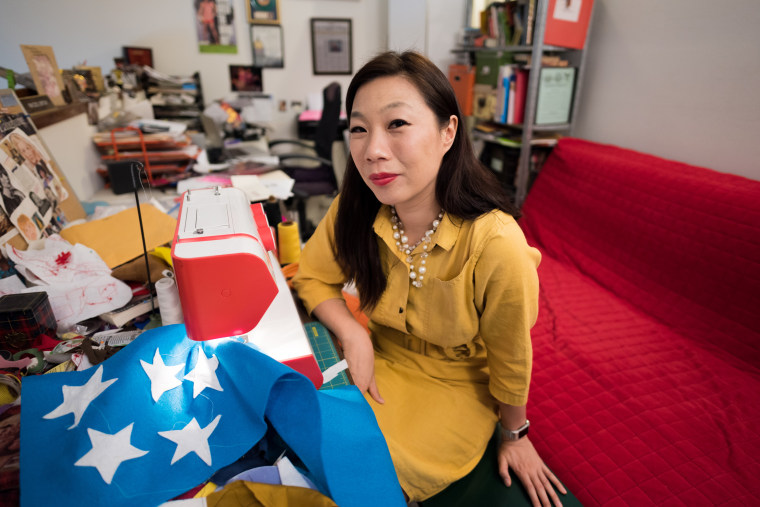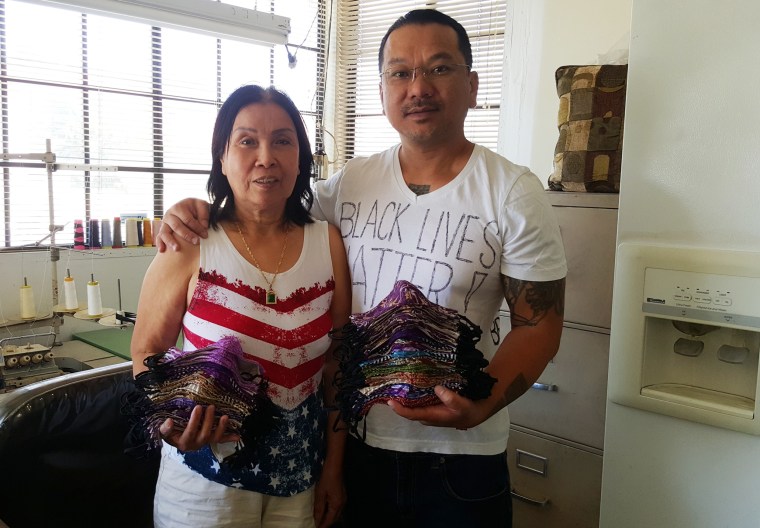A woman in California sews 25 masks for a battered women's shelter. Another sews 80 for the formerly incarcerated. A third woman in Pennsylvania sews 100 masks for the Crow Creek Sioux Reservation. The mask-makers are part of the Auntie Sewing Squad, a national network of nearly 400 volunteers that sews cloth masks and distributes them to at-risk communities for free.
So far, the Auntie Sewing Squad — made up of mostly women of color shipping their creations to disadvantaged groups — have created around 50,000 masks.
For Gina Rivera, a stay-at-home mom with four children, making masks is a way to be useful. Because she has a disability and two of her kids have autism, she’s unable to work, so the Southern California resident makes about 100 masks per week.
“If you don’t have access to something and I can give you this for free, take it,” she told NBC Asian America. “I can’t donate money. But I can donate masks.”
The Squad started in March, at the beginning of California's coronavirus lockdown. Kristina Wong, a Los Angeles-based performance artist, posted a photo on Facebook of a mask she made with the caption: "If you are immunocompromised with no access to masks, I can mail you one if you don't mind really messy stitching. Made on my Hello Kitty sewing machine."
Within days, she had gotten around 200 requests, some of them from social workers and nurses. Less than a week later, she posted on Facebook asking for help: "Can you sew?" From there, the Auntie Sewing Squad was born.
"We've done a lot of great work. And I think what's more remarkable is this community that we've sort of organically built," Wong said.

They send the masks free of charge to vulnerable groups: women's shelters, undocumented communities, farmworkers and Native American citizens. And recently they've been giving out masks at protests and sending others to the NAACP, as well as sewing fabric banners with phrases like "Black API Solidarity."
Wong estimated that the Squad sews 4,000 to 6,000 masks a week.
"I thought this whole thing was supposed to be a two-week stopgap," Wong said. "But we still get these requests. And they're from communities that don't have running water, or they're two hours from Walmart — it's all these communities that the federal government didn't care about before all this. And they're certainly not going to step in now."
The Auntie Sewing Squad is run entirely on donations via Donor Box.
Full coverage of the coronavirus outbreak
In the early days of the operation, just two months ago, brick and mortar fabric stores were shut down, so it was a struggle to get supplies, Wong said. Friends would donate old clothes, scrap fabric and elastic; fitted sheets and headbands were repurposed into protective gear.
Now, the process is more streamlined: Some people source materials; others cut out fabric, nose guards and elastic; others do the sewing. And then there are "aunties" who oversee on-the-ground communication and make sure the masks reach their intended destinations.
One of them is Constance Parng, who, like Wong, is an artist. But these days she's coordinating shipments of masks with groups, including with the Navajo Department of Health.
"I really never imagined that I'd be doing any of this," she said. "I'm just an actress, a writer, who woke up one day and thought maybe I can help some people. And then, next thing you know, I'm on the phone with epidemiologists, emergency response teams and deputy incident commanders — finding the most urgent needs in First Nations in real time and getting our masks to them ASAP."
Parng has also overseen four supply vans to Native American territories, containing sewing machines, sewing supplies and cleaning products. For her organizing abilities, the group has given Parng the nickname "Auntienie Fauci."
The Squad also started a Zoom summer camp to teach kids how to sew. Around 40 participated on the first day, from ages 6 to 12. Rivera teaches the weekly classes and her children are also helping to make masks. “This has made me a better mom,” she said. “Knowing that I’m giving back to the community and serving others outside of my home…this makes me feel better and more empowered. And teaching my kids to give is an opportunity that I would never have had otherwise.”
To Parng, the Auntie Sewing Squad is a profound example of allyship: "People who are undervalued in society can help others who are oppressed and undervalued in this society."
Another member of the group is “Uncle” Van Huynh, who was released from prison 15 months ago after serving 26 years for a juvenile conviction. Now living in Southern California, his mother, Cuong Thi Tran, taught him how to sew and the two of them make masks together.

They’ve sent the protective gear to formerly incarcerated groups, including those released from ICE detention. Rejoining society has been “overwhelming,” he said, but being part of the Squad has helped ground him.
“I’m so new to society and life really, and I’m learning so much from them,” Huynh said.
"Through my street life days and through prison, I always believed that I was doing good, that I was bringing peace, respect and honor for Asians," he went on. "The tragedy is that nobody taught me how to fight for these things in a constructive way. Nobody told me that sewing is a way of fighting."
Download the NBC News app for breaking news and alerts
Huynh is now an advocate for social justice and prison reform and on the day of the interview, had just come back from a Black Lives Matter protest. To him, making masks has been especially fulfilling. “We’re making kid sizes, and every time I’m making them, I’m like, ‘This is going to a kid. That can help them,’” he said.
The Squad also takes care of each other. Huynh, whose green card was revoked because of his conviction, is at risk for deportation. Wong wrote a letter to California Gov. Gavin Newsom asking for a pardon for Huynh. When Rivera’s sewing machine broke down, Wong sent her a new one. Some aunties make food and deliver them to other Squad members.
“I think it’s amazing and I’m very proud to be a part of it,” said Rivera.
It has been a whirlwind couple of months for Wong, and she's not sure how long the Auntie Sewing Squad will continue working. But as long as there are requests for masks from vulnerable communities, the Squad will keep sewing, she said. Just as how the word "auntie" denotes family, closeness and love, to Wong, making masks "is a literal way of saying: 'I want you to have this protection. I want you to see our care.'"